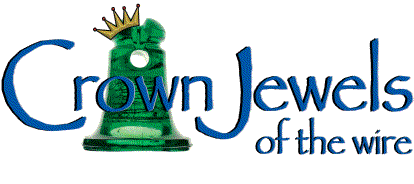The Porcelain Corner
Reprinted from "INSULATORS - Crown Jewels of the Wire", April 1972, page 16
I now have 26 Insulators in my Lapp collection. I have pin, post and
suspension types. My prizes (to me, anyway) are a U-821 with 1931 date and a
U-756 variant with the "pumpkin pie" orange glaze. My Brookfield
collection stands at about 150 units. As soon as I get working I hope to go to
the nearest show. Haven't been to one for a year. Until then I am just trading
off my spare glass and porcelains. It keeps the Post Office busy!
Sincerely,
Robert Winkler

Drawing by Robert Winkler

Dear Dora,
Above is a picture of an insulator that we found recently. I thought maybe
you could put it in the research division of the magazine, since I have not seen
any like it in any of the books. The overall height is 8-1/4", width
1-7/8", and the metal base height is 3-3/4" with the width of the
metal base being 1-3/4". The wire extends above the top part of the
insulator 1-5/8". The metal part on the bottom is solid metal with the
bottom dipping into the inside to a depth of 1-3/8". The top of the metal
part is made of composition material gray and white in color with sparkly silver
looking particles. There is a metal screw inside the composition part that
screws into the metal base. The metal base has 2 holes in it to nail on top of
the post. I was wondering if anyone has seen any of these. I think it is real
unusual.
Sincerely,
Jerry Stevens
256 Flourite
El Paso, Tex. 79932
I found 4 white insulators in Minnesota. There were 2 on each pole. They
don't seem as hard as a real porcelain. Only embossing on them on dome,
Suspension insulators, inc., Patent Pending. They have a split part way down
front and back where wire went through. If anyone can give me some information
on this one I would appreciate very much to hear from you.

Clarence Grundeman
4825 Alexander Dr.
Oxnard, Cal. 93030



Dear Dora,
While researching for insulators in old volumes of The Electrical Engineer,
I came across an article about the "Locke indestructible steel insulating
pin and insulators." In this article were the two pictures shown here,
although they did not reproduce very well. Figure 1 shows the transposition
insulator (on top of the pole) that M. & E. Dutcher illustrated in the
November 1971 issue of Crown Jewels on page 25. Also shown in Figure 1 are two
insulators like CD# 287, two triple petticoat porcelains similar to U-923 and a
helmet similar to CD# 259 and 260.
The following is a typed copy of the latter half of the Locke article from The
Electrical Engineer, November 20, 1985.
"In Figure 1 there are shown a few of the many uses to which the
indestructible steel insulator pin may be put. As will he observed the pins can
be attached to the top, bottom, and sides of the cross arm, or to pole tops,
break arms, or to cross arm braces. Wherever placed, they present a neat
appearance and may be depended upon to resist all reasonable strains of line
construction. The illustration also shows the Locke patent break arm in position
under and on top of the cross arm, also the Locke large triple petticoat
porcelain insulator, triple petticoat glass insulator transposition insulator
and cable insulator.
The triple petticoat china insulator, shown in Figure 2, is made from the
highest grade chinaware. It measures 5 1/4 inches in diameter and 4 inches in
height, and has over 12 inches of surface between the wire contact and the
supporting pin About 10 inches of this surface is on the under side of the
insulator, out of reach of direct rainfall, where it keeps comparatively dry.
The surfaces of the bottom of the insulator are perpendicular, and therefore
catch no foreign matter."
Sincerely,
Elton and Lynda Gish
614 Dallas Street
Port Neches, Texas 77651
We saw this unique item at Bakersfield show end were quite impressed with it.
Gerald Brown is seeking any information that you may have concerning this
specialty item.
LOCKE SPECIALITY

This heavy, hand made sculpture created from porcelain shows nine pigs
sitting around a trough. This article could have been made to be used as a desk
ornament, a card holder, a holder for paper clips or the like. The name, Fred F.
Locke, Victor N.Y. is embossed on the front.
To those who are familiar with the early struggles of Mr. Locke in the
insulator business, the story of his losing the control of his company is well
known.
It can, I think, be well imagined that someone who knew this story of his
losing control, might have been trying to depict, in this artifact, the group of
directors of the company sitting around the board table deciding his fate.
Each pig is different, both in size and color. They are all done in in brown
and white of varying degrees. Could it not have been the intent of the sculptor
to show the different characteristics of each of these men as they decided to
oust Fr. Locke? That is, in reality, they were sitting as a bunch of pigs around
a trough awaiting a feed.
The theory here stated is not entirely original with me. Mr. Rodney Wing,
from whom I acquired this interesting article also advanced such an idea. Mr.
Wing had bought it from an antique shop where nothing was known of it's origin.
Perhaps the history of this artifact is lost forever; but it certainly makes
a beautiful symbol to all porcelain insulator collectors.
| 